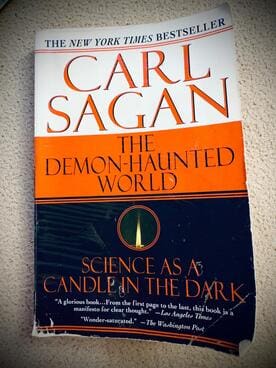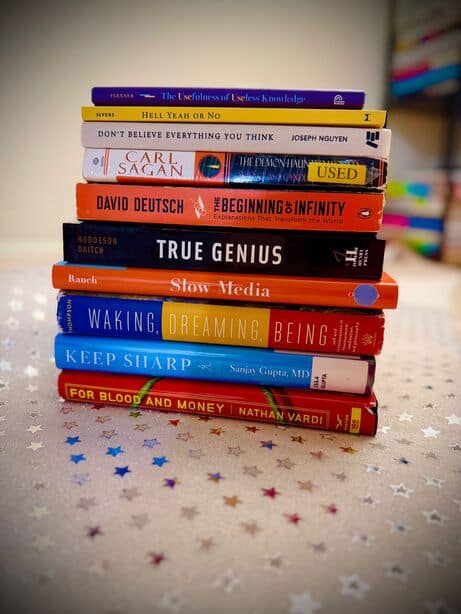It is time to share some of my best reads in the 2nd half of 2024. I shared a list for the 1st half here.
Over the years, I observed a dilemma among people I know about which form of books should they be reading. Just 20 years back, books meant a physical form of printed books. But today, e-books have become another form of books that are in some aspect more convenient.
What form of books should we be reading then?
In a way, it is a personal choice. Read whatever form you find pleasing or comfortable. But if you care about comprehension, retention, and understanding, then you might have to choose one over another. Multiple studies suggest that physical books have an advantage over e-books when it comes to comprehension and retention of the reading material.1
Besides, reading is as much a sensory experience as it is a mental experience. You experience holding a book, turning pages, highlighting lines, and taking notes in your body. No wonder you can remember more when you read a physical book. Someone said it beautifully-
“Print books are better simply because they take up space. Space on the counter, on the shelf, in your mind. Press a button and an ebook disappears forever.”
E-books offer advantages like cheaper prices, better portability, no storage problem, etc. In my case, I read most of the time physical books. Since I read more non-fiction books than fiction, it makes more sense for me to read physical books for better comprehension. Kindle becomes a splendid choice if I turn to fiction or read during travelling.
My suggestion would be to prioritise as: Physical books > e-books > pdf
On that note, here are some book recommendations based on my last 6 months of reading-
The Demon Haunted World by Carl Sagan

Since the time I started taking Science seriously, Carl Sagan has been one of my hero. In fact, if someone asks me ‘name three people from history (dead or alive) you like to meet‘, Carl Sagan would be one of them.
I knew about this book from my undergraduate days, but never read it until my post-doctorate. Every science enthusiast must read this book. The evolution of science has been a great journey, and it took years of effort from a great number of scientists to earn the respect for science in society. The book argues for scientific skepticism and critical thinking in a brilliant manner.
The book gives a peak to Carl Sagan’s own life and into his thinking process and elaborates readers on what scientific temperament should look like. Books like this inspire generations of kids to take up science or at least scientific thinking.
The Beginning of Infinity by David Deutsch

Very rarely I come across books that are as original and optimistic as this one. David Deutsch is a theoretical physicist and a popular figure. The book revolves around answering a key question: What makes science progress?
The answer in one line is – good explanations. Our capacity to create better explanations is limitless, and so is the advancement of science and technology. Better explanations could significantly advance human knowledge. The book draws a connection among physics, philosophy, biology, politics etc., thus offers a holistic view of the human quest for knowledge.
Keep Sharp by Sanjay Gupta

Most people these days are aware of physical fitness, but somehow some of us overlook our mental agility. Brain is perhaps the most complex and important organ that controls thinking, memory, breathing, emotion, etc. and we must take care of this vital organ to live an active life.
With age, cognitive decline and memory loss is common, but you can slow it down to a great extent by learning and implementing practical strategies suggested in this book. You will become more aware of how food, sleep, moving your body, connecting with people, etc. impact your brain’s performance.
True Genius by Lillian Hoddeson and Vicky Daitch

Have you heard about John Bardeen?
Probably not. Despite winning two Nobel Prizes in physics for his revolutionary work on semiconductors and superconductivity—discoveries that power our modern world—most people, including science students, have heard little of him.
Why is that?
Probably he was not flamboyant and focused on his work at the laboratory. But I get to know about this remarkable scientist’s character, work ethic, personal life, thought process, etc. through this book. If you wish to take up scientific research as your career (or already in one), you should read this biography.
Apart from that, this book offers historical context on the development of key scientific fields like semiconductor and superconductivity that were John Bardeen’s area of work.
Slow Media by Jennifer Rauch

In a time of fast and quick media consumption, this book advice to consume slow media. Slow media means what?
Slow media allows for deeper engagement with content through a more mindful and thoughtful approach to information consumption.
What we find today in social media in the name of information is mostly sensationalism, and they are so fast that we barely have any time to think through. This harms our brain more than benefit us.
This book advocates for mindful consumption, prioritizing quality over quantity, and offers various methods to achieve this.
Don’t Believe Everything You Think by Joseph Nguyen

This book has helped me understand better the root cause of anxiety and worry. The book is based on the ancient Indian principle of ‘thinking is the root cause of suffering.
Why do people get anxious?
Because people experience or anticipate something not so good in their lives. But the experience or thought of something is not itself good or bad. It is when we think about it from our perception; it becomes good or bad.
You get an award itself is not any good or bad news. But thinking about it make yourself happy due to social recognition and various other reasons. Similarly, losing a job is bad from our perception (thinking about it).
If you want to understand the distinction between thought and thinking and thereby manage your emotions better, read this book.
The Usefulness of Useless Knowledge by Abraham Flexner

Why fundamental scientific research is irreplaceable for prosperity in the world?
With basic and curiosity-driven science funding continuously shrinking, this question becomes increasingly crucial, and this book provides a brilliant answer.
Abraham Flexner himself was the mind behind the establishment for Institute of Advance Studies Princeton, where he brought brilliant minds around the world, including Einstein.
The book argues the idea that seemingly “useless” knowledge, pursued purely out of curiosity, is actually the foundation for significant innovation and progress. I couldn’t agree more with the book. Every policymaker, funding agency, professor, students should read this important book.
Waking Dreaming Being by Evan Thompson

This book explores the deepest questions of humankind. What is the nature of self? What is consciousness? How does our brain respond to waking, dreaming, and meditative states?
The author blend neuroscience, eastern philosophy, personal anecdotes to provide a unique perspective on these complex queries. The author’s references to Indian philosophy and knowledge systems demonstrate their depth.
If you want to dive deeper into consciousness, brain, and a holistic view of the self, pick up this book. Reading this one made me more aware of myself. I felt peace within.
Hell Yeah or No by Derek Sivers

The best way I could describe this is ‘wisdom in your pocket’. The book is small in its size but not on its content. Through small essays, the book imparts valuable message to its readers. If you know Derek Sivers, then you may be familiar with his style of writing. I love his writing and his whole approach to life. Needless to say, he is one of my favorite human being.
For Blood and Money by Nathan Vardi

This book is the last read of 2024 and a fascinating one. Working as a chemist and reading about drug development regularly made me curious about this book. And the book delivered more than I expected.
The majority of people have little understanding of the extensive process required to bring a successful drug to the market. Creating a drug for diseases such as cancer requires unwavering dedication, financial resources, patience, and perseverance. Reading this book has expanded my knowledge about the entire drug discovery process and the valuable contributions made by small biotech companies to this endeavor.
That’s all for this year. I hope you will gain great insights by reading these books. Feel free to comment below (or reach out) if you’d like more info on any of these books, or books in general. I will publish again my book recommendations in 2025. Happy New Year!
Reference
- Don’t throw away your printed books: A meta-analysis on the effects of reading media on reading comprehension ↩︎




